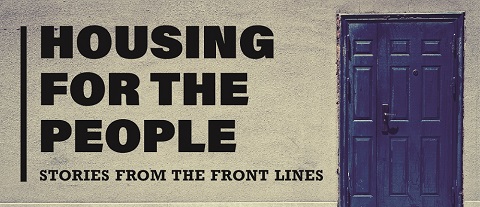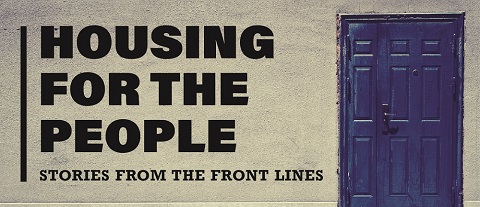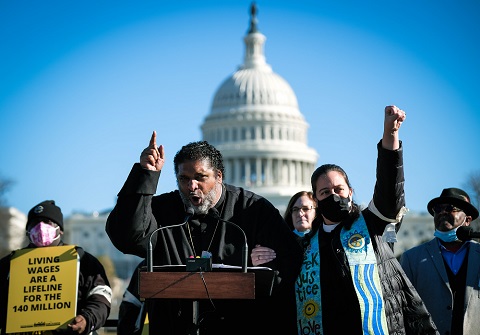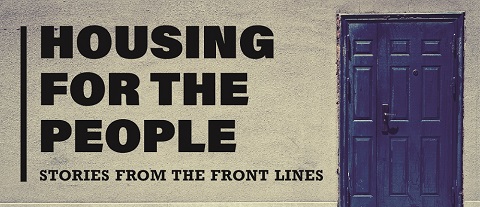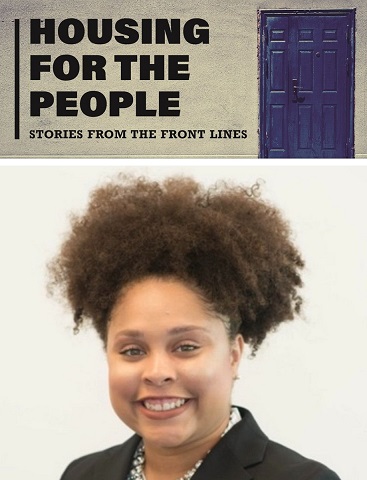By Ann-Derrick Gaillot
When the members of KC Tenants show up together in their yellow shirts, they come boldly proclaiming their demands on their backs: “What we want is safe, accessible, and truly affordable homes.” KC Tenants leader Diane Charity reads the black print to me over the phone from Kansas City, Missouri where the tenants union and advocacy group is based. She emphasizes the last demand with a straightforwardness that has come to define the group’s approach to creating change. “Truly affordable homes doesn’t mean that these out of state people that come in and get all this funding to make these affordable houses [that are] cheaply made,” she says. “Hike the rent up every year to the point where it puts us out, which gentrifies our neighborhood, and then they act like they’re doing us a favor.”
Rather, KC Tenants, made up of members of the city’s communities of renters, fights for cooperative housing, social housing, and a dignified response to the city’s housing, eviction, and homelessness crises. And ever since its formation in 2019, it’s made its demands for a better world known through carefully-researched policy proposals as well as direct actions matching the urgency of the issues they’re addressing.
From leaders chaining themselves to a county courthouse door in an effort to stop eviction court proceedings to confronting city Mayor Quinton Lucas at a protest at City Hall, KC Tenants has never taken it easy on Kansas City’s elected officials. And why would they? Its members experience the harms of the city’s long-standing affordable housing and eviction crisis first-hand on a daily basis. “One of our founding philosophies is that we are the experts on housing,” says Charity, who was a founding member of KC Tenants alongside Founding Director Tara Raghuveer, Board President Tiana Caldwell, and Brandy Granados. “We are the experts because we have the lived experience.”
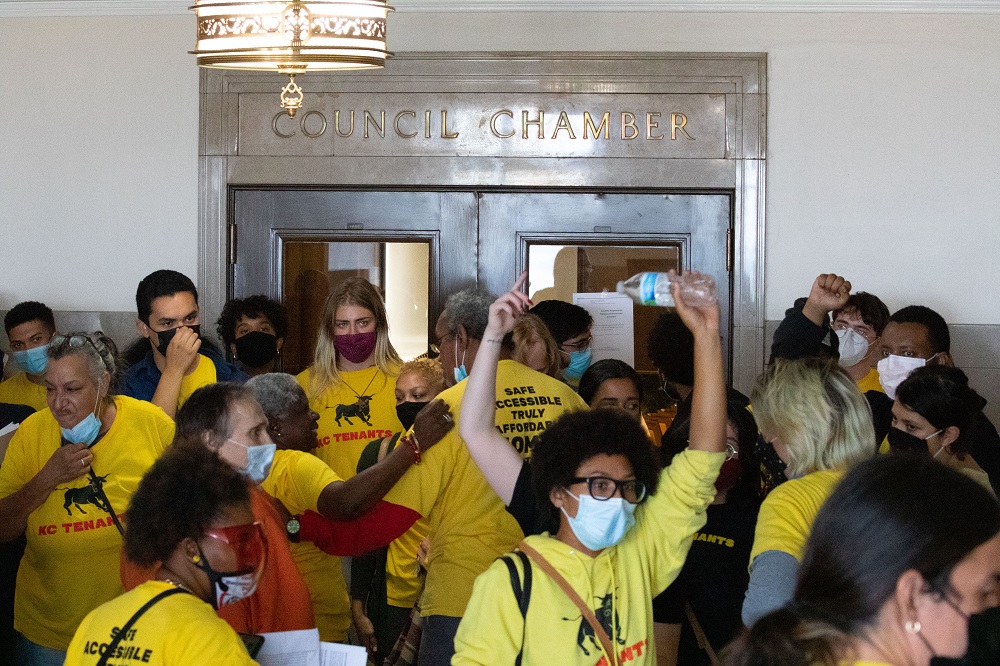
On the day of our interview (18 November 2021), Charity and her fellow KC Tenants members were preparing for the organization’s town hall with the Mayor in attendance. That evening, organizers led those gathered at the auditorium of a local school, with hundreds more viewing on Facebook Live. It included an opening song, a panel answering questions on social housing and the group’s plans for a Housing Trust Fund, and testimony from renters in the audience on their visions for housing in the city.
KC Tenants has consistently kept pressure on Lucas to listen to and face the city’s most housing vulnerable residents ever since his election to the office just months after the group was founded. At their dogged insistence, he spent his first night as mayor in the substandard apartment one KC Tenants member lived in with her children, complete with sorely-needed but unprovided repairs and the sounds of gunshots outside. The group’s creative direct action sent a clear message to city officials: Kansas City’s tenants are taking power into their own hands.
As in other American cities, renters in Kansas City face rising rents, a dearth of affordable housing, and a general attitude of disdain for the many struggling with housing insecurity and homelessness. But in recent years, by harnessing the power of grassroots organizing, an extensive, months-long research project examining other cities, and unrelenting hope, KC Tenants has managed to achieve big wins for the city’s tenants. These included successfully advocating for the city’s adoption of an historic Tenants Bill of Rights in 2020. “All of these politicians that talked so condescendingly towards it said, ‘We’ll write that ordinance for you and then we’ll get it passed.’ And we said, ‘No, you won’t. You won’t write anything because you don’t live our experience,” remembers Charity about the fight for the Tenants Bill of Rights. In her eyes, the group rejects a local tradition of polite passivity and confrontation avoidance known in the area as ‘Kansas City Nice’.
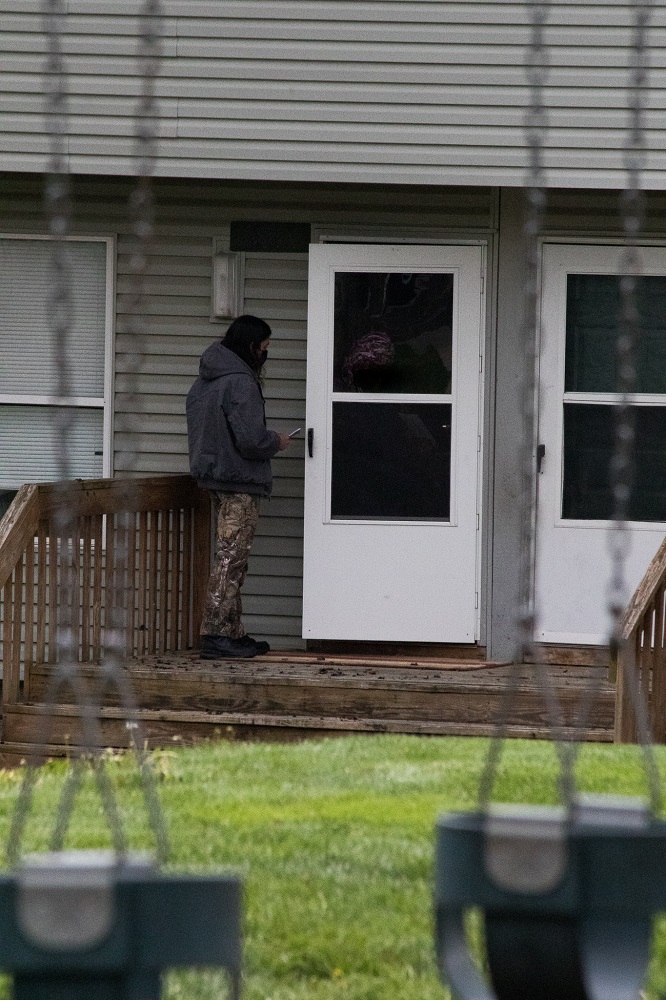
The kind of determination KC Tenants uses to keep public officials engaged and held accountable to their constituents may go against the grain of ‘Kansas City Nice’. However, Charity surmises that sticking to a ‘Kansas City Nice’ attitude does nothing for the fight for truly affordable housing. “We’re saying we’re not taking that BS anymore. We do have rights and we will stand up,” she says. “We’re that beam of light that people are saying, ‘Wow, These people have the nerve to think that they’re going to get the world as it should be instead of surviving the world as it is. And that is what we’re doing. We know it can be better.”
Kansas City, smack dab in the Midwest in a Republican-led state, is often overlooked in the national conversation about the US’s housing crisis. And yet the KC Tenants union’s successes and structure — which includes a hotline, a team that researches and crafts policy, a team that organizes tenants unions, and a team that helps tenants fight evictions as well as unfair and illegal housing practices — offers a model of possibility for fed up tenants worldwide.
It entered 2021 in high gear, proclaiming the months ahead the Year of the Tenant, beginning with Zero Eviction January, during which the group’s members took direct action to delay more than 900 eviction hearings that month. Then, after months of advocacy and organizing, the group helped win funding for an Office of the Tenant Advocate to enforce the Tenants Bill of Right in Spring 2021. It ended the year with another major victory: the city council passed an ordinance providing legal counsel to tenants, no matter what their income is. Drafted and pushed by KC Tenants, along with fellow advocacy groups the Heartland Center for Jobs and Freedom and the Missouri Workers Center/Stand Up KC, the historic program is slated to be in place by summer 2022. Now, the union is pushing for an ordinance it drafted for a People’s Housing Trust Fund that calls for the city to divert funding from policing and tax incentives for developers into permanently establishing and maintaining affordable housing.
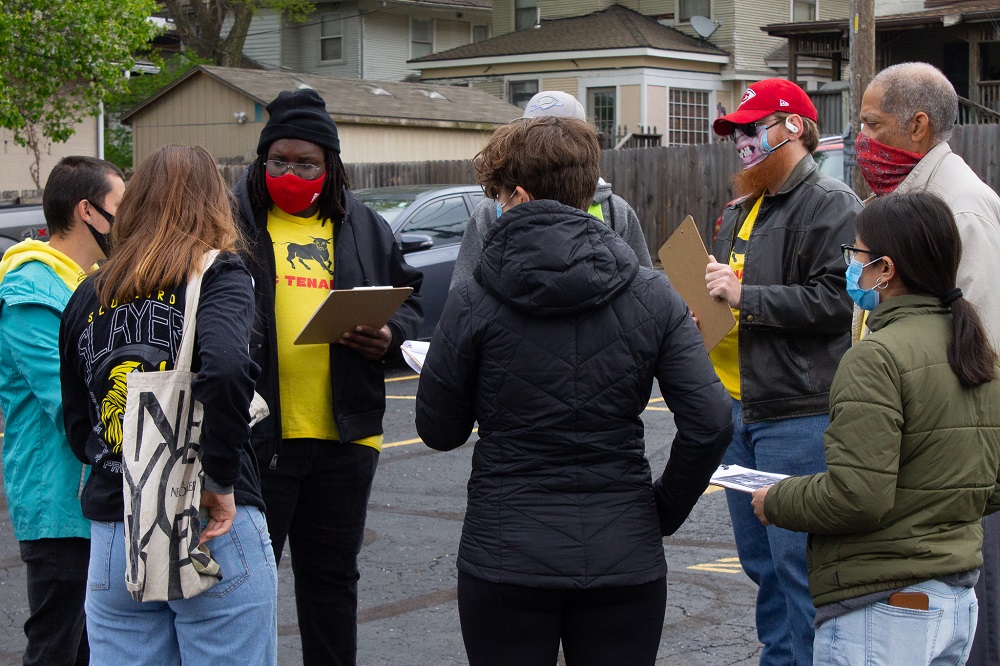
Though many cities already have housing trust funds in place, KC Tenants hopes to establish one with crucial safeguards in place as far as tenant rights and representation in governance, avoiding creating another “a slush fund for developers and property owners,” as the group says in its fund proposal released in June 2021. “ “We can fight for something. We may not get everything, but if we start with housing, that’s a start for us. Then we can go on to the next thing and the next thing,” Charity says. “But if you don’t have a place to lay your head—to actually sleep and then get dressed to go to school and work the next morning— it’s the scariest thing that can ever happen to you, you know? It’s unfathomable that people are doing that.”
Though every community has its unique struggles, Charity’s advice for people looking to start their own tenants unions is the same. “Give grace. Give grace to whomever you’re speaking with. Listen to them and allow them to tell their story,” she says. “[Whatever] their walk of life, they have that seed of hope in them that things will get better. We spark that seed of hope and it takes us to where we’re trying to get to obtain safe, truly affordable housing that’s accessible for anyone and everyone. Housing is a human right.”
Ann-Derrick Gaillot is a freelance journalist and writer based in Missoula, Montana. Find more of her work at annderrickgaillot.contently.com.
Courtesy of INSP North America / International Network of Street Papers












